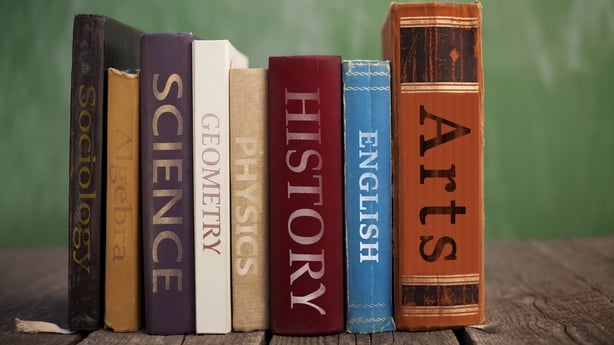This week a most unusual guest joined first-year students at Boherbue Comprehensive school in north Cork during history class.
It was the ghost of a medieval peasant and she gave students a vivid insight into life in the middle ages. The class had been learning about the feudal system.
This medieval peasant was conjured up by teacher Patrick Hickey.
"You are the ghost of a peasant who died during the middle ages. Tell me about your hard life and how you died from the plague," Mr Hickey asked artificial intelligence app ChatGPT.
Within seconds the ghost responded.
"Greetings mortals. I am the ghost of a medieval peasant forever bound to this world by the horrors of my past," she wrote.
"My life was one of endless toil and hardship from the moment of my birth I was condemned to a life of backbreaking labour and constant struggle."
For the next 40 minutes rivetted students plied the ghost with questions: Did she have children? Did they go to school? What did they eat?
The ghost kept answering.
"It was the plague that claimed my life," she told them, "a merciless disease that ravaged my body and soul. The symptoms were unbearable, high fever, chills, muscle aches and extreme fatigue. I felt as if I was drowning in my own flesh."
On Tuesday night, Mr Hickey described all this to teachers who tuned into his online seminar on ChatGPT.
"The students knew it was AI [artificial intelligence], they're not dim", he said, "but you know the emoji that your mind is blown? There was a lot of that in my class yesterday."

It wasn't just one medieval peasant who was brought to life but the entire period of history.
Around 900 teachers joined Tuesday's webinar and it would be fair to say that some of their minds were blown too.
"A seminal moment" was how one teacher described it in the webinar comments section. "It has energised me and I am dying to share ChatGPT with my colleagues," wrote another.
Mr Hickey's talk was titled "Join the revolution! How ChatGPT is transforming education" and the webinar was hosted by Tralee, Clare and Navan's Education Support Centres.
These are State centres responsible for the ongoing professional development of teachers.
Interest among teachers was huge. Attendance at Tuesday's webinar was the largest ever experienced by the centres.
What is ChatGPT?
ChatGPT is an artificial intelligence programme that generates text in a way that simulates human conversation.
It answers questions and completes tasks set for it. In a matter of seconds, it harvests information from a vast amount of internet and other sources, to produce its answers in a format imitating human interaction.
When used wisely its results are impressive, but like any technology, it has its failings, and it can be abused.
Many teachers, parents and others are fearful of the impact it could have not just on teaching and learning, but also on assessment.
But Mr Hickey says there is just no point in being afraid.
"It's here and it's not going to go away, and we can't put our heads in the sand," he says. He points to panics many decades ago around the humble calculator, how it would "ruin maths, ruin kids".

After that there was the internet, then social media and mobile phones.
Mr Hickey is an evangelist, on Tuesday evening he warned his audience: "AI is not going to replace teachers, but teachers who use AI will replace those who don't".
He cautioned teachers to, at the very least, keep an open mind.
"ChatGPT will allow us [teachers] to get back to the thing that we love doing, teaching"
Of those in attendance on Tuesday almost 60% said they had never used the programme, almost 30% said "once or twice", 10% said they had used ChatGPT a few times, and just 2% said they used it "daily as part of my work".
"By the end of this year that 2% will be closer to 50%," Mr Hickey predicted.
Much of Tuesday's meeting focused on how teachers can use the technology to reduce the amount of time they spend on often tedious administrative tasks such as the preparation of materials for classroom activities.
Take the devising of pupil worksheets for instance. After the meeting, Terry O'Sullivan who is the Director of Tralee Education Support Centre, asked ChatGPT to come up with a simple worksheet for children on the 32 counties and their main towns.
"Within 10 seconds it had created 32 questions, with 32 separate answers for the teacher," he told RTÉ News.
"If you were to do that yourself it would take 2-3 hours."
"I believe firmly that ChatGPT will allow us [teachers] to get back to the thing that we love doing, teaching and educating", says Mr Hickey.
The potential dangers and challenges?
But what about the dangers that come with this new technology? What about the potential it creates for student cheating for instance?
Mr Hickey agrees that the new technology does present the system with a challenge in this regard.
As well as teaching history, for the past 13 years he has also marked Leaving Certificate exam papers and coursework for the State Examinations Commission.

In this the first year that Leaving Certificate students completing history projects worth 20% of their overall marks will have had access to AI, he is aware of the potential for cheating in his own subject and in others such as Geography and Religious Education where students have similar projects to complete and submit in coming weeks.
But he is sanguine and says, "students have cheated since God was a boy and like any technology, ChatGPT is open to abuse. But students should remember that ChatGPT is not without its failings".
Mr Hickey asked the chatbot to produce an essay on African American involvement in World War II and he describes the essay he received as "hopeless".
"If that essay had come from one of my students, I would have given it back to them."
ChatGPT can come up with answers that are simply incorrect, and it can omit key details.
Mr Hickey asked the app to give an account of the moon landing. The answer he received had one glaring omission, the placing of the American flag on the surface of the moon.

In terms of Leaving Certificate assessment he cautions: "If students use ChatGPT as their sole source they are not going to get a H1 or a H2 or a H3."
But he is passionate about the programme’s potential as a learning tool and as a research aid for students.
"It will help with individual learning. For students who don't like going to an adult, they will be able to turn to ChatGPT instead."
They could for instance ask the programme to help them create an essay structure, he says.
They can use the programme as an aid "but of course the best student will then move away from it and go to the library and get a book".
"People will use it to cheat, that is for sure, but we have to educate students that it is in their own best interests to do the work themselves."
This is such new technology and we are only on its cusp.
Mr Hickey has been looking at ChatGPT for just a few months now and he readily admits he is nowhere near having all the answers. Actually, no one is.
Embracing change
Bill Gates also believes that ChatGPT could be "revolutionary".
In a blog post this week, the Microsoft founder wrote that the development of AI was "as fundamental as the creation of the microprocessor, the personal computer, the internet, and the mobile phone".
He too believes it will become a crucial tool in education.
But Mr Gates too knows that the technology has also the potential to cause harm.
In his blog post, he warned that "the world needs to establish the rules of the road so that any downsides of artificial intelligence are far outweighed by its benefits".
Asked about the potential abuse of ChatGPT by students, to cheat in Leaving Certificate coursework, the State Examinations Commission told RTÉ News: "The SEC would strongly caution any student that might be tempted to cheat in an examination, regardless of the means, whether in the written examinations or in relation to their coursework, that serious consequences can result.
"They could lose marks or the full result in a subject; they could lose the results of the entire examination; or they could be debarred from entering for any of the State examinations for a specified period."
Leaving Certificate subject examiners meet every year in late June to finetune their approach to marking.
Expect ChatGPT to be high on the agenda of this year's meetings.
Read More:
Why is ChatGPT generating so much chatter?
Irish companies working with new version of ChatGPT
ChatGPT update more 'human': company says







